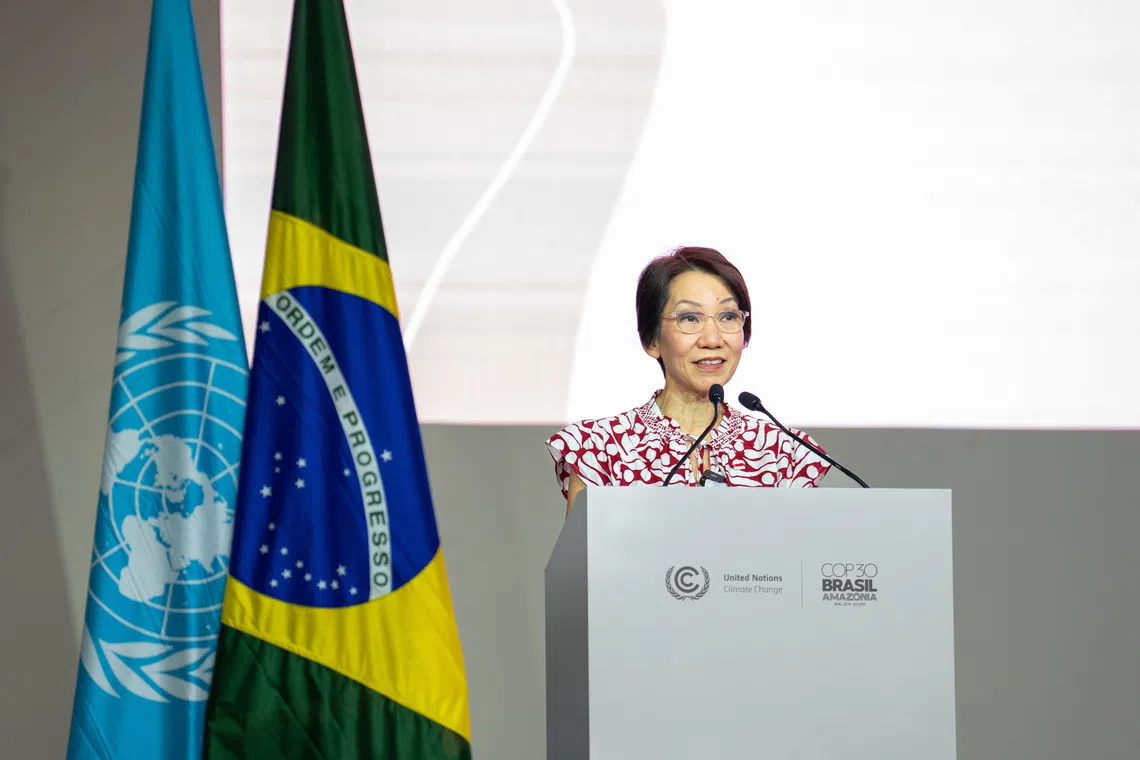With climate risks outpacing global response, COP30 must deliver concrete results: Grace Fu
Sign up now: Get ST's newsletters delivered to your inbox

Minister for Sustainability and the Environment Grace Fu delivering Singapore's national statement at UN climate talks COP30 on Nov 17.
PHOTO: COP30 SINGAPORE PAVILION
BELEM, Brazil – As climate change continues to outpace the world’s collective response to the crisis, Singapore will be stepping up efforts to adapt to its impacts by developing the nation’s inaugural national adaptation plan over the next five years, Minister for Sustainability and the Environment Grace Fu said on Nov 17.
Such a plan will serve as the nation’s long-term road map, outlining actions that the Republic can take to enhance its resilience against climate impacts.
In her delivery of Singapore’s national statement at the COP30 UN climate talks in the Brazilian city of Belem, Ms Fu pointed to how the country is taking steps to protect its coastlines from rising sea levels and its people against heat stress.
Singapore will also continue to advance efforts to cut emissions, she added. Ms Fu cited various ways that the Republic is doing so, from sourcing lower-carbon energy sources to be used domestically, to inking partnerships on carbon markets.
At COP30, ministers from almost 200 nations have convened to kick-start the second week of the negotiations, which are expected to become more politically charged.
A main issue at the 2025 summit is adaptation
National adaptation plans are said to be important as they act as a blueprint for countries to access climate finance. The UN had asked countries to prepare such plans by 2025.
In her speech, Ms Fu pointed to the record temperatures of 2024 and increasingly frequent climate calamities. This is happening against a backdrop of intensifying geopolitical tensions and economic uncertainty, which has put multilateral cooperation to the test, she added.
“Today, Singapore reaffirms our commitment to working with the global community to make collective progress towards our shared climate goals,” she said.
Ms Fu noted that Singapore cannot achieve its goals in isolation as South-east Asia warms faster than the global average, with coastal cities and delta communities facing increasing flood and heat risks.
“Building regional resilience is therefore critical,” she said, adding that the Republic is working with its neighbours to deepen regional climate science and improve adaptation planning.
Researchers from NUS’ Tropical Marine Science Institute, for example, are working with other Asean countries to study the impact of climate change on the region’s agricultural sector.
“The study will analyse data on the projected physical impacts of climate change on five agriculture crops: maize, rice, cassava, sugar cane and soya bean, and propose mitigating measures that Asean nations can take to address the impact of climate change on the five crops,” Ms Fu said.
She said the Brazilian presidency’s call to collective action captures the spirit needed by the global community. The host nation of the summit had said that COP30 would have a large focus on implementation, or translating goals into concrete action.
Ms Fu also announced that Singapore will be making a monetary contribution to the United Nations Framework Convention on Climate Change – the UN body overseeing the Paris Agreement – that will support developing countries in their reporting requirements.
“(This can) help to ensure accountability as developing countries strive to deliver positive climate outcomes,” she said. “Only when all countries have the systems and capacity to act can global climate finance deliver, and keep the goals of the Paris Agreement within reach.”
As a small, low-lying island state, climate change is an existential challenge for Singapore, Ms Fu added, which is why the Republic was one of 13 countries to submit its 2035 climate goals by the original UN-imposed deadline in February.
Singapore has pledged to reduce emissions to between 45 million and 50 million tonnes by 2035
A slew of measures has been rolled out to help the country meet these targets.
Singapore is diversifying its energy mix by importing low-carbon electricity, and studying the potential deployment of nuclear energy, among other things.
Ms Fu said Singapore is working with its Asean partners to realise the regional power grid, which will enable low-carbon electricity to flow across borders, balance supply and demand, improve energy security, and advance a shared pathway towards net zero for South-east Asia.
But finance still remains a hurdle for many developing countries to grow their economies in greener ways.
Singapore is also contributing on this front, Ms Fu said, pointing to the country’s efforts on blended finance and carbon markets
Blended finance draws on funding from the public and philanthropic sectors to make climate-friendly projects more bankable for commercial players to come on board.
The Republic has, for instance, a national blended finance initiative dubbed Financing Asia’s Transition Partnership.
Under this, Singapore has already mobilised US$510 million (S$664 million)
Ms Fu also highlighted the Republic’s coalition with Kenya and Britain to develop high-integrity voluntary markets, which has grown to 10 member countries during COP30. They are Canada, France, Kenya, Panama, Peru, Singapore, Switzerland, Britain, New Zealand and Zambia.
These governments are committed to advancing climate action by making clear how businesses can credibly use high-integrity carbon credits, in addition to their corporate decarbonisation plans, she said.
“We also welcome initiatives, such as the Asean Power Grid Financing Initiative co-developed by the World Bank and the Asian Development Bank, to lower financing hurdles and enhance the bankability of cross-border electricity trading projects in the region,” she added.
She concluded by reaffirming Singapore’s full support for the COP30 presidency and the UN’s multilateral process.
“As an Implementation COP, COP30 must enable parties to turn their commitments into concrete results,” Ms Fu said. “Singapore stands ready to work with all parties to ensure that our collective efforts keep global climate targets within reach.”



